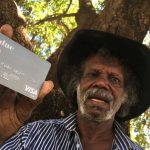Outback Work-for-the-Dole Scheme Discriminates Against Indigenous Communities

The federal government’s outback work-for-the-dole scheme is wreaking havoc in remote Indigenous communities.
Introduced on July 1 2015, the Community Development Program (CDP) has been labelled an overly punitive scheme that may breach the Racial Discrimination Act.
The program currently comprises around 35,000 participants: the vast majority of whom are Indigenous. It requires them to work 25 hours a week in order to receive unemployment benefits, which is up to three times more than unemployed people in urban areas.
Earlier this year at a Senate Estimates hearing, the prime minister’s department confirmed that between July 1 and September 30 last year, 54,997 penalty notices were issued to CDP participants. Since the program began, over 200,000 have been handed out.
Under the scheme, participants who are late or fail to turn up to a required activity are fined 10 percent of their fortnightly Newstart allowance. For a serious breach, a participant can have their payments suspended for up to eight weeks.
Ninety percent of people breached under the program have been Aboriginal and Torres Strait Islanders.
With extreme discrimination
Australian Council of Trade Unions (ACTU) Indigenous officer Lara Watson believes the CDP is “basically exploiting Aboriginal and Torres Strait Islander workers.” She described a situation where individuals are working as CDP participants in positions that they used to be undertaking as paid jobs.
Those working on the programs “have absolutely no workplace health and safety,” Ms Watson, a Birri Gubba woman from central west Queensland explains. “And they’re not protected with workers compensation if they’re injured.” Participants do not receive superannuation payments either.
The CDP is implemented in remote communities, where around 98 percent of the population is Indigenous, according to Ms Watson. CDP participants have to work 25 hours a week for 52 weeks a year,” she says. Meanwhile in “city centres and regional areas it’s only 15 hours a week for 6 months.”
“It’s clearly a very discriminatory program,” she adds.
Commonwealth probes
Currently, there’s a Senate Standing Committee inquiry, along with an investigation by the Australian National Audit Office into the appropriateness and effectiveness of the design and implementation of the CDP.
Director of legal advocacy at the Human Rights Law Centre Adrianne Walters wrote in their submission to the Senate inquiry that “all Australians rightfully expect to be treated equally and respectfully by governments,” and to be paid fairly. However, this is not being afforded to CDP participants.
Both inquires will be delivering their reports in September.
First Nations Workers Alliance
The First Nations Workers Alliance (FNWA) is a campaign that’s standing up to the injustices being faced by CDP participants and advancing their working rights. Powered by the ACTU, the FNWA is a collaboration between Aboriginal and Torres Strait Islander and non-Indigenous trade unionists.
“It’s a national movement in response to an unjust program,” Ms Watson explained. “It was launched about a month ago and we’ve been inundated with support, which is very heartening.”
Community-based development
The CDP replaced the Coalition government’s Remote Jobs and Communities Program (RJCP), which was a jobs-focused scheme that was axed, when it became glaringly obvious to both the Abbott and Turnbull governments that there actually was a lack of jobs in remote communities.
The RJCP officially replaced the Community Development Employment Project (CDEP) in July 2013. The CDEP was a much-lauded scheme run by local organisations and councils.
Launched by the Fraser government in 1977, the CDEP replaced unemployment benefits in remote Aboriginal and Torres Strait Islander communities and enabled Indigenous-run businesses and industries to be establish in areas where labour supply exceeded demand.
The CDEP had 35,000 participants in 2004, and involved 265 community-controlled organisations. Due to its success over time, the program was expanded into regional and then urban areas.
However, despite this proven success, the Howard government began dismantling the program in 2004. In 2007, as part of the NT Intervention, the government abolished the CDEP in remote Aboriginal communities, where it implemented this policy, which ended the employment of many.
“Real jobs and employment”
Tony Abbott told the Australian last year that “abolishing CDEP was a well-intentioned mistake and CDP is our attempt to atone for it.” But Jon Altman writing in Inside Story explained that the CDP “is a work-for-the-dole scheme that pays participants far lower hourly rates than under CDEP.”
But, the CDEP was not perfect. MS Watson pointed out that the FNWA have some issues with it “particularly around superannuation and penalties.” However, compared with the CDP it was definitely a better program,” she told Sydney Criminal Lawyers®.
A major difference between the two programs is that the CDEP was not available for private employment or investment, whereas the CDP is.
“If you’ve got private companies and businesses that are operating in and around these communities, they now have the capacity to access CDP workers,” Ms Watson outlined. And these private businesses aren’t paying these workers a real wage.
One thing that the CDEP did reveal, according to Watson, is that “there is definitely jobs in these communities that can be taken up by locals,” when they’re developed and supported by the community.
An alternative that empowers
The FNWA are currently working with various community organisations to design an alternative program to the CDP. Ms Watson said the chosen model would have to “cover necessary workplace rights,” such as a minimum wage, occupational health and safety and WorkCover.
The alliance isn’t advocating for a return of the CDEP, but a new model that incorporates community control and works towards real jobs and employment. Along with, “the opportunity for training and upskilling that will actually turn into employment opportunities,” Ms Watson said.
And the FNWA will be “working very closely with communities on how” the new program is developed, she continued.
As for the discriminatory CDP, it’s high time it was abolished. “It’s not empowering. It’s not delivering outcomes. We’ve got families that are starving,” Ms Watson concluded. “It’s extremely disempowering for Aboriginal and Torres Strait Islander people.”







